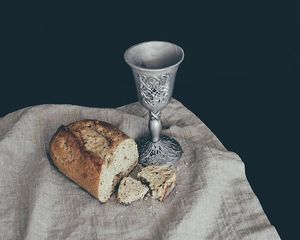‘Do this in remembrance of me’ (1 Corinthians 11:24)
In one of his famous ‘Princeton sermons’, Charles Hodge observed that we ‘cannot commemorate Christ as our Saviour without thereby acknowledging ourselves to be his, the purchase of his blood and devoted to his service’ (Charles Hodge, Princeton Sermons, p. 373). What we must grasp at the outset is that the Lord’s Supper is an ordinance that claims our heart and commands our consecration, now and hereafter. ‘For as often as you eat this bread and drink this cup, you proclaim the Lord’s death till he comes’ (1 Corinthians 11:26). It captures the flavour of the permanence, the abiding character, of a genuine Christian commitment. In coming to the Table, I declare a heart for Jesus Christ, a witness to the efficacy of the cross, and a desire to lift him up as my own Saviour. Such a declaration is both evangelical and evangelistic: evangelical, because it comes from a heart transformed by the gospel; evangelistic, in that it proclaims to a watching world that this Saviour is the one they also need to know.
We must also understand that the Lord’s Supper is an observance by which God strengthens and confirms believers in their devotion to himself. The Westminster Shorter Catechism expresses this well in answer to the question, ‘What are the outward means whereby Christ communicates to us the benefits of redemption?’ The answer given is, ‘The outward and ordinary means whereby Christ communicates to us the benefits of redemption are his ordinances, especially the word, sacraments, and prayer; all which are made effectual to the elect for salvation.’ The power of God accompanies his ordinances, to the end that our present and future consecration to the Lord should be secured.

The power of the Lord’s Supper
The Christian church has always understood the sacraments, along with the Word of God preached, and prayer in the life of the believer, to be means of grace; that is, by these means, God projects his enabling and transforming power into the lives of the participants. As one of these means, the Lord’s Supper is designed to accomplish certain practical goals consistent with the gracious purposes of God for his people. One thing it is not designed to do, however, is to convert people to Christ. While it is evangelistic, it is not a ‘converting ordinance’ to be dispensed to the unbelieving in the hope of bringing them to Christ. In contrast to the preaching of the word, which is a ‘converting ordinance’ to be dispensed to unbelievers and believers alike, the Lord’s Supper is clearly intended for those who are already believers. It is intended to stir up personal godliness in committed Christians. It is thus a ‘confirming ordinance’, designed to confirm the faith professed by the communicants.
No magic
This spiritual growth results from the work of the Holy Spirit in and through the sacrament, as it is faithfully received. It does not happen automatically. There is no magic in the Lord’s Supper. The mere ingestion of the bread and wine conveys no blessing. The Corinthian Christians attended many communion services, and partook of a great deal of bread and wine, but in doing so they actually denied God’s power. As a result, he withheld his power and visited them in righteous judgement (1 Corinthians 11:29). God deals with us as responsible individuals, and expects us to take him seriously. We flout his will at our peril.
The mystery of the operations of his power in the Supper is that (in Hodge’s words) ‘If we have faith, we experience the power of the sacrament; if we have it not, we do not experience it.’ By the power of the Holy Spirit, the Lord confirms to faithfully participating believers the forgiveness of their sin and their redemption through his sacrificial death. This produces in them, experientially, a deepening sense of union with Christ, a growing fellowship with other Christians, and a strengthening of faith and confidence as redeemed people, who know what it is to have eternal life in Christ.

Our future obedience
Because the Lord’s Supper focuses on the death of Jesus and brings us to the foot of the cross, it also leads us to the empty tomb and the claims of the risen Saviour. Jesus is no longer on the cross and no longer in the tomb. He suffered, died and rose again from the dead to become the exalted Mediator, the Redeemer of God’s elect, the Saviour of the lost, and the Head over all things to the church. What flows from the cross is new life in a risen Saviour. To miss that point in the Lord’s Supper is to miss what it is saying to us about ‘all our tomorrows’. Over a century ago, Henry Belfrage exhorted his people in Falkirk, Scotland, in the following words.
‘In eating this bread and drinking this cup, you have been acknowledging the obligations which his death lays upon you to serve him. You have been giving a solemn pledge in the face of heaven and earth, that you will labour to promote the great moral purposes of his sufferings. You have declared that you will crucify the flesh, with its affections and lusts; that you will never listen to the temptations which may solicit you to abandon the Saviour; that on your heads, the guilt of apostasy shall never be charged; and that to deny yourselves, to take up your cross and follow him, is the purpose of your hearts, and the business of your lives’ (Henry Belfrage, Sacramental Discourse, p. 327).
Humility of mind
Yet for millions in this world, the Lord’s Supper (or what passes for it in some churches) is often the only religious observance left in their lives, and a sadly perfunctory performance at that. Between ‘communion Sundays’ there is often no observable devotion, or even church attendance. The rest of life is relentlessly non-religious, or even downright irreligious, and therefore devoid of any significant spiritual content. Even their observance of communion is routine and lifeless, an ingrained habit rather than the effervescent enthusiasm of a deeply felt love for the Lord.
Each believer is to confess with humility of mind and exalted comprehension that it is ‘no longer I who live, but Christ lives in me’ (Galatians 2:20). Anything less, such as a cold, mechanical observance, unfelt and ritualistic, is a tragic substitute for the real thing. It indicates a heart that is not right with God. What use will you make of the Lord’s Supper in the coming week? Have you felt its claims upon your pattern of life? Has the Lord Jesus Christ not spoken to your heart in the Supper?

Ponder also the fact that putting into practice the clear moral and spiritual claims of the Supper must tend to stop the mouths of those who despise the gospel. Fresh resolve to follow Christ proves the sincerity of the communicants’ faith. The scandal is that millions go to the Lord’s Table and then contradict its meaning in daily life without seeing any problem. Here is where the subtlety of Satan lies. Why is it that, in churches with large nominal memberships, the Lord’s Supper is one of the few events that get people into church? Surely it is that Satan may mock Jesus, by showing up the scandalous inconsistency of people who live like pagans in between the ‘communions’ they assiduously attend.
Consider afresh what Jesus Christ has done. Did he suffer, only for us to pamper ourselves with self-satisfied neglect of his claims? Did he die, for us to be easy with our sinful ways? Did he rise from the grave that we should go on living for ourselves, with scarcely a thought about sin, righteousness and judgement to come?
Tests of sincerity
In his first letter, the apostle John makes the point that when we are brought under the searchlight of God’s righteousness, the honest and realistic response is confession of sin. ‘If we say we have not sinned, we make him a liar and his word is not in us’ (1 John 1:10).
Confession of sin is fine, but it is not the same thing as personal godliness. So John takes pains to assure his readers that the goal of such confession is freedom from sin. ‘My little children,’ he writes, ‘these things I write to you, so that you may not sin. And if anyone sins, we have an Advocate with the Father, Jesus Christ the righteous. And he himself is the propitiation for our sins, and not for ours only, but also for the whole world. Now by this we know that we know him, if we keep his commandments’ (1 John 2:1-3). Notice the transition between verses 2 and 3. Jesus is the ‘propitiation for our sins’; that is, he satisfies the holy anger of God against our sin, causing God to become favourable (propitious) towards us. And this in turn demands that we actually ‘keep his commandments’ in daily life. Knowing Christ truly as Saviour issues in obeying him as Lord. There is no possibility of the one without the other. They constitute a unitary experience of saving grace. In succeeding verses, the apostle describes a number of tests that may be applied to show whether we are truly trusting in the Saviour.

1. We know that we know God if we keep his commandments (1 John 2:3-4).
2. We see God’s love perfected in us if we keep his Word ( 1 John 2:5a).
3. We truly abide in him if we walk as Christ walked (1 John 2:5b-6).
Notice how John takes us from the death of Christ, as the substitutionary sacrifice, propitiating the anger of God against sinners (v.2), to evidential fruit in those who have truly believed in the Son of God (vv. 3-6). The ‘proof of the pudding’ is in the eating. The very phraseology employed in verse 3 (‘by this we know that we know him’), challenges us with the vital question. ‘Do we really know the Lord?’ Do we evidence the ‘this’ that proves we know Jesus in the power of the resurrection?
Brought to the cross
In the Lord’s Supper, we are brought to the cross and charged to consecrate ourselves afresh to Christ. What other than personal consecration shall we render to the Lord for all the benefits he has bestowed upon us? To be sure, we are not worthy of the least of them and never will be. But in Christ we shall be more than conquerors, through him who loved us. We love him, because he first loved us. Because we love him, we will keep his commandments. And we will do so with the glad gratitude of those who know what it is to be lost and then found; dead and then made alive, all through the grace of the only Saviour, Jesus Christ, who died that sinners such as us should not perish, but have everlasting life.









